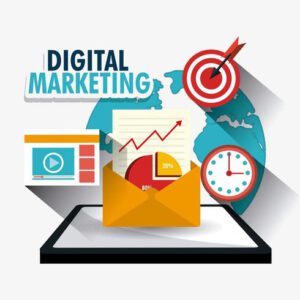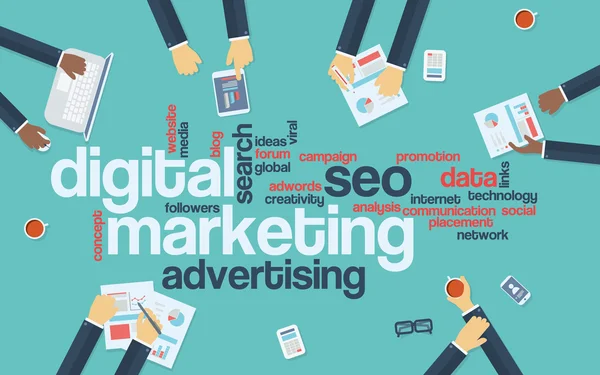Introduction
Unlike traditional marketing methods, digital marketing provides innovative, cost-effective, and data-driven solutions that enable brands to connect with audiences worldwide. Whether you are an entrepreneur, a small business owner, or someone looking to build a career in digital marketing, understanding the fundamentals of digital marketing is essential.
This guide will explore what digital marketing is, its significance, various components, and practical strategies to help you get started.
What is Digital Marketing?
Digital marketing is the use of digital platforms, technologies, and data analytics to promote brands, products, and services. It encompasses various online marketing strategies, such as search engine optimization (SEO), social media marketing, email marketing, and content marketing, among others. By leveraging the internet, businesses can effectively target their audiences, engage with potential customers, and drive revenue.
Why Digital Marketing Matters
Here’s why:

Global Reach – The internet connects businesses to customers worldwide, removing geographical limitations.
Cost-Effective – Digital marketing is more affordable than traditional advertising methods like TV commercials and print media.
Real-Time Analytics – Marketers can track and measure campaign performance, making data-driven decisions to improve outcomes
Personalization – Digital marketing allows businesses to tailor messages based on consumer behavior and preferences.
Better Conversion Rates – Online marketing techniques, such as SEO and PPC, help drive qualified traffic, leading to higher conversion rates.
Key Components of Digital Marketing
Digital marketing is a vast field that includes multiple strategies and techniques. Here are some of the most essential components:
1. Search Engine Optimization (SEO)
Key SEO practices include:
Keyword research and optimization
High-quality, relevant content creation
Backlink building
Mobile-friendly website design
Improving website loading speed
2. Content Marketing
Content marketing involves creating and distributing valuable, informative, and engaging content to attract and retain an audience. Popular content formats include:
Blog posts and articles
Videos and tutorials
Infographics
Ebooks and whitepapers
Webinars and podcasts
3. Social Media Marketing (SMM)
Social media platforms like Facebook, Instagram, Twitter, LinkedIn, and TikTok provide businesses with powerful tools to build brand awareness, engage with customers, and generate leads. Effective social media marketing involves:
Creating compelling and shareable content
Engaging with followers through comments and messages
Running targeted ads
Collaborating with influencers
4. Pay-Per-Click Advertising (PPC)
PPC is a paid advertising model where businesses pay a fee each time their ad is clicked. Google Ads, Facebook Ads, and Instagram Ads are popular PPC platforms that help drive instant traffic and conversions.
5. Email Marketing
Email marketing thrives on creativity and engagement, and unique content can make all the difference. One effective approach is using interactive elements like polls, quizzes, or scratch-to-reveal discounts, which encourage user participation.
Personalized subject lines
Engaging email copy
Strong call-to-action (CTA)
Segmentation and automation
6. Affiliate Marketing
Affiliate marketing involves partnering with individuals or companies (affiliates) who promote your products or services in exchange for a commission on sales. It is an excellent strategy for expanding reach without incurring high advertising costs.
7. Influencer Marketing
Influencer marketing leverages the audience and credibility of influencers to promote products. By partnering with influencers in your niche, you can build trust and increase brand awareness.
8. Online Reputation Management (ORM)
Maintaining a positive online reputation is crucial for brand credibility. ORM strategies include:
Monitoring online reviews and responding to feedback
Engaging with customers on social media
Publishing positive brand stories and testimonials
How to Get Started with Digital Marketing
If you’re new to digital marketing, follow these steps to begin your journey:
Define Your Objectives – Identify your marketing goals, whether it’s increasing website traffic, generating leads, or boosting sales.
Understand Your Target Audience – Research your audience’s demographics, interests, and online behaviors to tailor your marketing efforts.
Choose the Right Platforms – Focus on channels where your target audience is most active, such as social media, search engines, or email.
Create Valuable Content – Develop high-quality content that educates, entertains, or solves problems for your audience.
Leverage Social Media – Engage with followers, post regularly, and use paid promotions to expand reach.
The Future of Digital Marketing
As technology evolves, digital marketing continues to change. Emerging trends include:
Artificial Intelligence (AI) in Marketing – AI-powered chatbots, personalized recommendations, and automated content creation are revolutionizing marketing strategies.
Video Marketing Growth – Video content, including live streaming and short-form videos, is dominating digital marketing strategies.
Augmented Reality (AR) and Virtual Reality (VR) – Brands are using AR and VR to create immersive shopping experiences.
Conclusion
Digital marketing is a powerful and essential tool for businesses looking to succeed in the modern online landscape. By understanding the various components and implementing the right strategies, businesses can reach their target audience, build strong relationships, and achieve long-term growth.
Whether you are just getting started or looking to refine your approach, staying updated with the latest digital marketing trends and technologies will ensure your success in the ever-evolving digital world. Start your digital marketing journey today and take your brand to new heights
